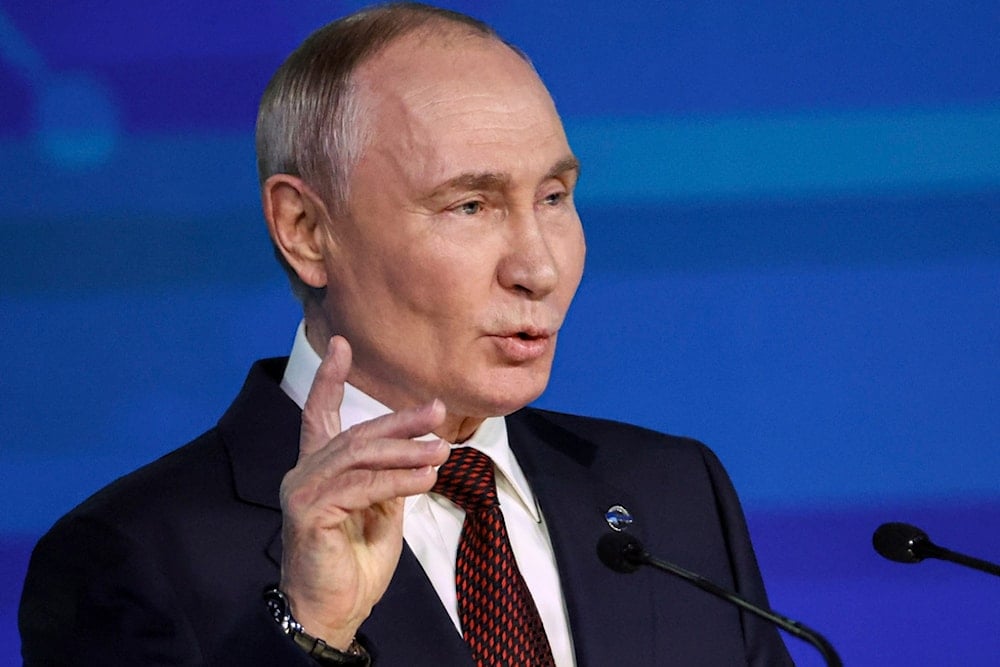Putin declares a 'new world order' is emerging
Russian President Vladimir Putin argued that nations worldwide are increasingly focused on asserting their unique identities, values, and aspirations for development.
-

Russian President Vladimir Putin speaks at a meeting with foreign policy experts at the Valdai Discussion Club in the Black Sea resort of Sochi, Russia, Thursday, Nov. 7, 2024. (AP)
At the Valdai Discussion Club in Sochi on Thursday, Russian President Vladimir Putin described a shifting global landscape and a new world order that he says is evolving away from Western dominance and toward a multipolar, diverse system.
Speaking to an audience of policy experts and international representatives, Putin portrayed Russia as a stabilizing force in this new order, positioned against what he called the "geopolitical greed" of the West.
Putin argued that nations worldwide were increasingly focused on asserting their unique identities, values, and aspirations for development.
"A completely new world order is taking shape before our eyes," he stated, contrasting it with historical systems like the Westphalian and Yalta models. He suggested that as global power dynamics shift, countries are more attuned to their self-worth and more determined to act independently.
The Russian president also raised alarms about the escalating risk of nuclear conflict, saying that no guarantees exist to prevent the use of such weapons, especially as international tensions mount.
He warned that unchecked conflicts could lead to "mutual destruction" as nuclear-capable nations expand and modernize their arsenals. Western calls for a strategic defeat of Russia, he argued, are pushing the world toward "extreme adventurism."
Read more: Putin revamps Russia's nuclear rules, unveils new arsenal guidelines
Criticism of NATO and Western policies
Putin reserved strong words for NATO, calling the alliance an "anachronism" and accusing it of undermining global stability. He characterized NATO's eastward expansion as a "creeping intervention" that threatens Russia's sovereignty and claimed the alliance is using Ukraine as a "tool to fight Russia."
According to Putin, NATO's role has been particularly destabilizing since the collapse of the Soviet Union, leading to what he sees as unnecessary conflict and tension in Europe.
Continuing his critique of Western influence, Putin claimed that Europe's political elites were more interested in preserving their power than fostering genuine growth, suggesting that their approach was increasingly out of step with the broader international community.
"The current of world politics…is in the opposite direction to the aspirations of the West," he said, asserting that the global trend is moving away from Western hegemony toward a system of "ascending diversity."
Alliance shifts and the rise of BRICS
Putin pointed to rising interest among some NATO members in cooperation with the BRICS alliance, which includes Brazil, Russia, India, China, and South Africa, as evidence of this global shift.
He lauded BRICS as a "model of constructive cooperation" that aligns more closely with the goals of a multipolar world order.
Putin suggested that this shift could lead other countries to reevaluate their alliances, hinting at the possibility of closer cooperation between NATO members and BRICS nations.
Uncontrolled migration and economic inequality
The Russian president also addressed the issue of migration, which he framed as a consequence of economic inequality between the "golden billion" of developed nations and the rest of the world.
Putin claimed that the uncontrolled influx of migrants into wealthier nations has fueled xenophobia and social tensions, adding that attempts to weaponize economic policies tend to harm the most vulnerable populations.
Call for dialogue
Despite his criticisms, Putin emphasized that Russia remains open to constructive dialogue with other nations and stated that pressure campaigns against Russia would not succeed.
"It should be clear to everyone: it is useless to put pressure on us, but we are always ready to negotiate," he said, reaffirming Russia's commitment to defending its sovereignty and achieving its goals if challenged.
In a final message, Putin depicted Russia's mission as broader than national interests, positioning it as a defender of universal rights and freedoms. He asserted that Russia was not only fighting for its own security but also for the right of other nations to exist and develop in a fair, balanced global order.
"We are defending universal rights and freedoms," Putin declared, framing Russia's actions as crucial for what he called the "successful development of the world."
Read more: How sanctions on Russia backfired on the West: Responsible Statecraft

 4 Min Read
4 Min Read








